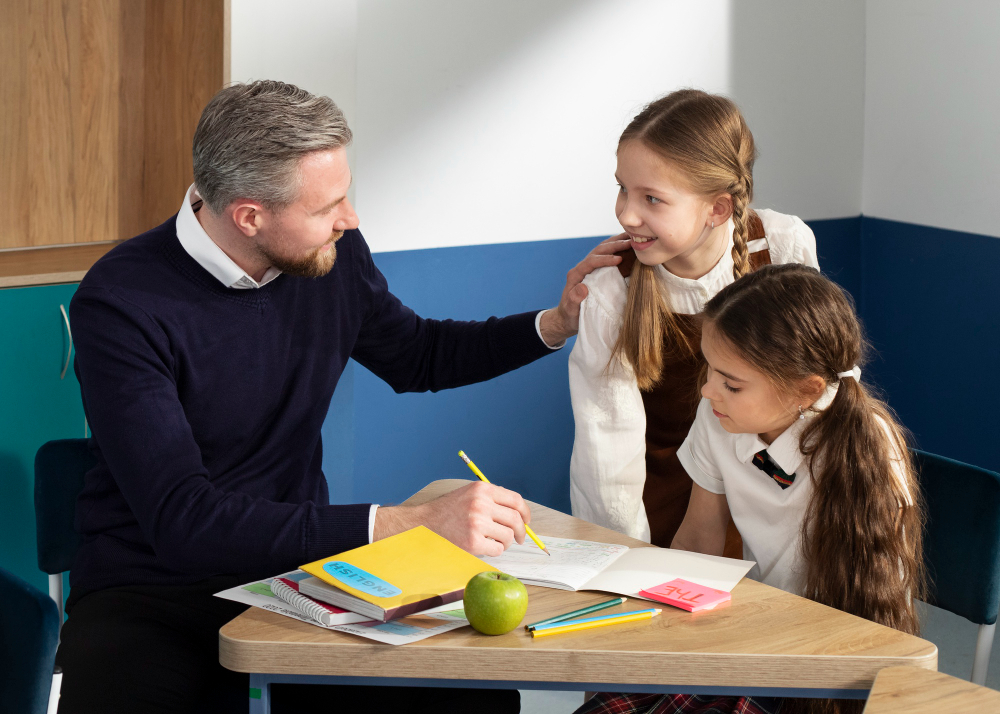Open communication is one of the most powerful tools teachers use to support emotional growth. At Candil Hall, teachers encourage students to talk about their feelings, whether they are happy, frustrated, or sad.
Through guided discussions, storytime, and role-playing, children learn how to identify their emotions and express them appropriately. For example, teachers may use visual aids like “emotion charts” to help students label how they feel. Over time, children develop the language to communicate effectively — a skill that strengthens both emotional regulation and social relationships.
This communication-based approach is part of what makes Candil Hall Preschool so unique. Teachers listen attentively and respond with empathy, helping children learn that their feelings are valid and manageable.
Building Empathy and Social Skills
Empathy — understanding and caring about others’ feelings — is one of the most important emotional skills for young learners. It helps them form friendships, resolve conflicts, and contribute to a positive classroom community.
Teachers at Candil Hall use group activities, cooperative play, and storytelling to nurture empathy. For instance, reading books that feature diverse characters and emotional experiences encourages children to see the world through different perspectives.
In collaborative settings like Kindergarten classrooms, teachers guide students in sharing, taking turns, and helping one another. These experiences teach children that kindness and understanding are key to working and playing together successfully.
Teaching Emotional Regulation and Problem-Solving
Emotional regulation — the ability to manage strong emotions — is a skill that develops over time. Teachers play a key role in helping children recognize their feelings and respond calmly.
When a child feels upset or frustrated, teachers model appropriate ways to cope, such as deep breathing, counting to ten, or using positive self-talk. They may also create “calm-down corners” in the classroom, where students can take a moment to reset.
At Candil Hall, this approach helps children understand that it’s okay to feel angry, sad, or excited — but it’s also important to respond thoughtfully. Through patient guidance, teachers empower students to solve problems independently, building confidence and self-control.
Fostering Confidence and Independence
Confidence plays a vital role in emotional growth. When children believe in themselves, they are more likely to take risks, make decisions, and handle challenges.
Teachers at Candil Hall nurture confidence by celebrating effort, not just success. They provide positive reinforcement when students try something new, helping them understand that mistakes are part of learning. This mindset builds resilience — a quality that supports both academic and emotional well-being.
In Candil Hall Elementary Schools, teachers encourage students to take ownership of their learning by setting goals and reflecting on their progress. These experiences cultivate independence and a sense of pride in their achievements.
Partnering with Families to Support Emotional Growth
Emotional development doesn’t stop at the classroom door. Teachers and parents work hand-in-hand to ensure children receive consistent support at home and school.
Candil Hall’s educators maintain open communication with families through progress reports, parent-teacher meetings, and daily updates. They share insights about each child’s emotional development and suggest ways parents can reinforce positive habits at home — such as practicing gratitude, discussing feelings, or reading together.
This partnership between school and family is one of the reasons Candil Hall stands out among Private Schools in Las Vegas. When teachers and parents collaborate, children feel secure, valued, and encouraged to grow emotionally and intellectually.
Integrating Emotional Learning into the Curriculum
At Candil Hall, emotional learning is not treated as a separate subject — it’s woven into every part of the curriculum. Teachers design lessons that naturally integrate emotional awareness with academics.
For example, during storytime, students might discuss how characters handle challenges or express emotions. In art class, children use colors and shapes to represent their feelings. During group projects, they practice teamwork and patience.
These experiences teach students that emotional intelligence is just as important as academic knowledge. By making emotional learning part of daily routines, Candil Hall helps children build skills that last a lifetime.
Frequently Asked Questions
1. Why is emotional growth important in early learners?
Emotional growth helps children understand and manage their feelings, build confidence, and form healthy relationships — all essential for success in school and life.
2. How do Candil Hall teachers encourage emotional development?
Teachers use empathy, communication, and structured routines to create a nurturing environment where children feel safe to express themselves and learn emotional regulation.
3. How do you teach children to handle frustration or anger?
Candil Hall educators model calm behavior, teach coping techniques like deep breathing, and guide students in solving problems peacefully.
4. What role do parents play in supporting emotional growth?
Parents are key partners. Teachers share strategies and insights so families can continue emotional learning at home, reinforcing consistency and security.
5. Does emotional development affect academic performance?
Yes. Children who are emotionally secure and confident are better able to focus, engage, and perform well academically.
Conclusion
Emotional development is the heart of early learning — it builds the foundation for every other area of growth. At Candil Hall Academy, teachers go beyond academics to nurture empathy, confidence, and resilience in every child. Through structured routines, open communication, and a supportive classroom culture, they help students develop the emotional intelligence needed to thrive in school and in life.
If you’re looking for a Private School in Las Vegas that values both academic excellence and emotional well-being, Candil Hall is the perfect choice. Contact us today to learn more about our programs and how we can help your child grow emotionally, socially, and intellectually.

